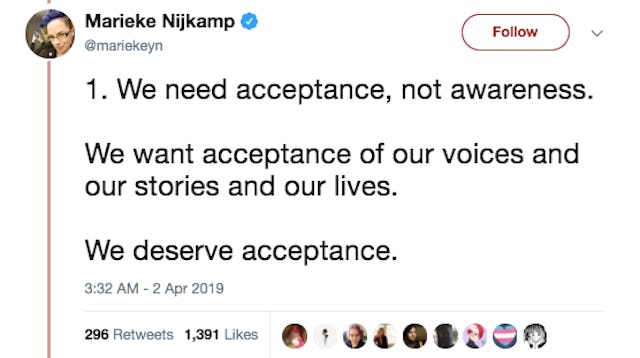Author Breaks Down What's Really Important on World Autism Awareness Day

Young adult author Marieke Nijkamp has a few thoughts about World Autism Awareness Day that everyone needs to read
It’s World Autism Awareness Day, a day for getting educated about the neurobehavioral condition that affects an estimated one out of 59 people in the United States alone, according to the Centers for Disease Control (CDC). What’s the best way to learn about this complex spectrum of disorders, and the best way that we can help everyone be healthy, happy, and supported?
While different organizations have released statements, perhaps the best guide we’ve seen today was written by young adult author Marieke Nijkamp, who’s best known for her best-selling books like This is Where It Ends and Before I Go, but who is also an activist that has autism herself.
She had some tough words for everyone today – not so much about autism awareness, but about something more important: autism acceptance.
Her next point is so important: when it comes to basically all other groups, we listen to the people within their groups, not their parents or other advocates. While some people with austism can’t speak up, others can, and we should listen to their voices before all else.
One of the largest Autism non-profits, Autism Speaks, has been under fire for several years, as many autism advocates point out that most of their budget is spent on awareness over actual services for people with autism, and that much of the “awareness” they spread dehumanizes autistic people, or paints the condition as frightening or terrible. While their intentions may be good, and while they fund important autism research, there are autism organizations that are much better at giving people with autism a voice and portraying them, and their condition, in a better and more accurate light.
And of course? In case it’s not obvious by now: listen. Listen to people with autism. Then listen some more.
While we’re at it, don’t portray people with autism either as a terrible destroyer or as a heartwarming inspiration. Instead, treat them as they are: individuals who deserve acceptance.
Her next point is even more important: just recognize and celebrate people with autism and what they do, just as we celebrate any other kind of diversity in our world.
From there? Educate yourself about autism and neurodiversity. Instead of focusing on differences and limitations, let’s try to focus on accessibility and connection.
Then, let’s consider how people with autism really need help and assistance. For many, that means fighting against ablism, cure narratives, and institutional abuse. It also means improving autistic health care and access.
And YEP, once again, vaccines don’t cause autism, and saying so is extremely problematic, both because it’s scientifically false, and because it adds yet another stigma to being autistic.
Finally, once we get that today should be all about autism acceptance, people should also consider that they can work on autism acceptance and autism rights every day of the year.
This is far from the first time Nijkamp has opened up about being on the spectrum or been active about autism. She’s a founding member of We Need Diverse Books, which works to make sure all children can see themselves in the pages of their books, and the editor of Unbroken, an anthology of stories that star teens with disabilities.
And as for her writing, she says that it’s inseparable from her autism.
“I started building worlds and writing stories to make sense of this world,” she said in an interview with Disability In Kid Lit. “To explore characters, social situations, real world events. To understand people. From that point of view, my autism and my writing are intrinsically linked.
She continued:
“My autism necessitates my writing. But it goes the other way around too. My autism allows me to keep entire worlds in my head. My writing gives me an outlet for hyperfocus and questions and wonderings. One of my very favorite things about writing stories is playing with balance and details and those scenes that make you so very happy. I love losing myself and finding myself in stories.”
We definitely learned some things about autism today (and all through listening). Pass it on.